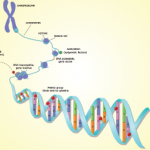 DNA methylation profiling may predict progression from a diagnosis of undifferentiated arthritis to a diagnosis of rheumatoid arthritis (RA) in patients, according to research published in the June 2021 issue of Arthritis & Rheumatology. The study by Carlos de la Calle-Fabregat, a graduate student at the Josep Carreras Research Institute, Barcelona, and colleagues suggests such profiling may help target treatments and improve clinical management.1
DNA methylation profiling may predict progression from a diagnosis of undifferentiated arthritis to a diagnosis of rheumatoid arthritis (RA) in patients, according to research published in the June 2021 issue of Arthritis & Rheumatology. The study by Carlos de la Calle-Fabregat, a graduate student at the Josep Carreras Research Institute, Barcelona, and colleagues suggests such profiling may help target treatments and improve clinical management.1
“Our study shows that DNA methylation, a major epigenetic trait, can anticipate how patients with undifferentiated arthritis will evolve,” says Esteban Ballestar, PhD, group leader of epigenetics and immune disease at Josep Carreras Research Institute and senior author of the study.
Epigenetics Underscores Heterogeneity
Autoimmune arthritides have a great deal of heterogeneity in terms of patient prognosis, joint damage and response to treatment.2
“Patients with undifferentiated arthritis cannot be classified by any definite arthritis diagnostic criteria. Some undifferentiated arthritis patients spontaneously [go into remission] or [their diagnosis] remains undifferentiated arthritis, while others eventually develop RA,” says Dr. Balestar. Thus, rheumatologists must focus on halting the inflammatory process and the progression of arthritis in all patients. Early diagnostic markers of disease evolution may aid rheumatologists in identifying which patients require a level of aggressive treatment and which may not.
The investigators designed the study to determine if DNA methylation profiles underlie the differences in disease progression. They analyzed DNA methylomes of undifferentiated arthritis patients and demonstrated that these patients had a distinct epigenetic signature relative to healthy individuals. The researchers also identified specific differences between patients who were initially given an undifferentiated arthritis diagnosis and subsequently evolved to have a diagnosis of RA and those who remained with a diagnosis of undifferentiated arthritis. These results suggest that, from a molecular/epigenetic perspective, undifferentiated arthritis and RA are distinct disease entities. The results also indicate that molecular markers, such as epigenetic modifications, may be combined with clinical parameters to provide guidance for clinicians for diagnosis and treatment decision making.
Study Details
The investigators began by analyzing the DNA methylation profile of peripheral blood mononuclear cells from the Leiden Early Arthritis Clinic cohort to determine if their methylomes could anticipate the evolution of undifferentiated arthritis to RA. They found changes in the methylome in patients with arthritis were associated with numerous inflammatory pathways and transcription factors relative to healthy controls. In particular, the researchers identified differentially methylated positions associated with the enrichment of multiple categories related to inflammatory response, immune cell activation, vitamin metabolism and cytokine and chemokine signaling. Analysis of the transcription factor binding motifs revealed enrichment of motifs belonging to the RUNX transcription factor family in the hypermethylated cluster.
When the researchers performed a differentially variable position analysis, they found greater heterogeneity of DNA methylation within the group of patients diagnosed with undifferentiated arthritis at baseline compared with patients with RA or healthy donors. The investigators noted that this higher variability of the methylation profiles in the samples from patients with undifferentiated arthritis at baseline relative to healthy individuals was consistent with the clinical heterogeneity of patients with undifferentiated arthritis.
When the team then compared the baseline DNA methylation profiles to the clinical groups defined one year later (either undifferentiated arthritis or RA), they identified 12,381 hypermethylated CpGs and 4,159 hypomethylated CpGs in the individuals who maintained a diagnosis of undifferentiated arthritis compared with those who evolved to a diagnosis of RA. The differentially methylated positions in the hypermethylated cluster were enriched in areas related to antigen presentation through major histocompatibility complex (MHC) class I, as well as inflammatory cytokine signaling. When the team analyzed transcription factor binding motifs in the hypermethylated cluster, they found enrichment of motifs belonging to BHLH and Zf families. The hypomethylated cluster showed enrichments of transcription factors from ETS and Zf families. Taken together, the results suggest a pre-established epigenetic signature exists in patients with undifferentiated arthritis who will evolve to become patients with RA.
The investigators further characterized the subgroups of patients diagnosed with undifferentiated arthritis at baseline and compared the DNA methylation profiles of these patients with those of terminally differentiated patients with RA (i.e., those diagnosed as RA at baseline). Their data again supported the hypothesis that a pre-existing, RA-like epigenetic profile occurred in some patients with undifferentiated arthritis who then progressed to a diagnosis of RA.
“The most interesting finding for the team was the fact that patients display differential DNA methylation markers before they acquire a final clinical diagnosis,” Dr. Ballestar says, adding that the alterations may not be clinically visible at the baseline visit when the initial undifferentiated arthritis diagnosis is made.
Predictive Marker of Disease Progression
The researchers then investigated the possibility of using DNA methylation data to obtain predictive markers of disease progression. They found the highest precision occurred using a support vectors machine-generated model. This supervised learning model analyzed data, including rheumatoid factor and disease activity score 44 (DAS44), for classification analysis. The investigators found the addition of the CpG methylation data improved the predictive ability of clinical parameters. Thus, the authors propose a machine-learning strategy for DNA methylation-based classification may predict the evolution of patients with undifferentiated arthritis toward RA.
“DNA methylation is an attractive candidate biomarker [because] it’s a relatively easy-to-analyze epigenetic modification, and it can be easily used in conjunction with clinical information for this purpose,” says Dr. Ballestar.
“Furthermore, the recent increase in affordability for generating high-throughput ‘-omic’ data will enable its use in the clinics, in a near future,” he adds, suggesting DNA methylation may be able to—at least partly—overcome the limitations in the sensitivity of current routine clinical markers.
Lara C. Pullen, PhD, is a medical writer based in the Chicago area.
References
- de la Calle-Fabregat C, Niemantsverdriet E, Canete JD, et al. Prediction of the progression of undifferentiated arthritis to rheumatoid arthritis using DNA methylation profiling. Arthritis Rheumatol. 2021 Dec;73(12):2229–2239.
- Pitzalis C, Kelly S, Humby F. New learnings on the pathophysiology of RA from synovial biopsies. Curr Opin Rheumatol. 2013 May;25(3):334–344.

